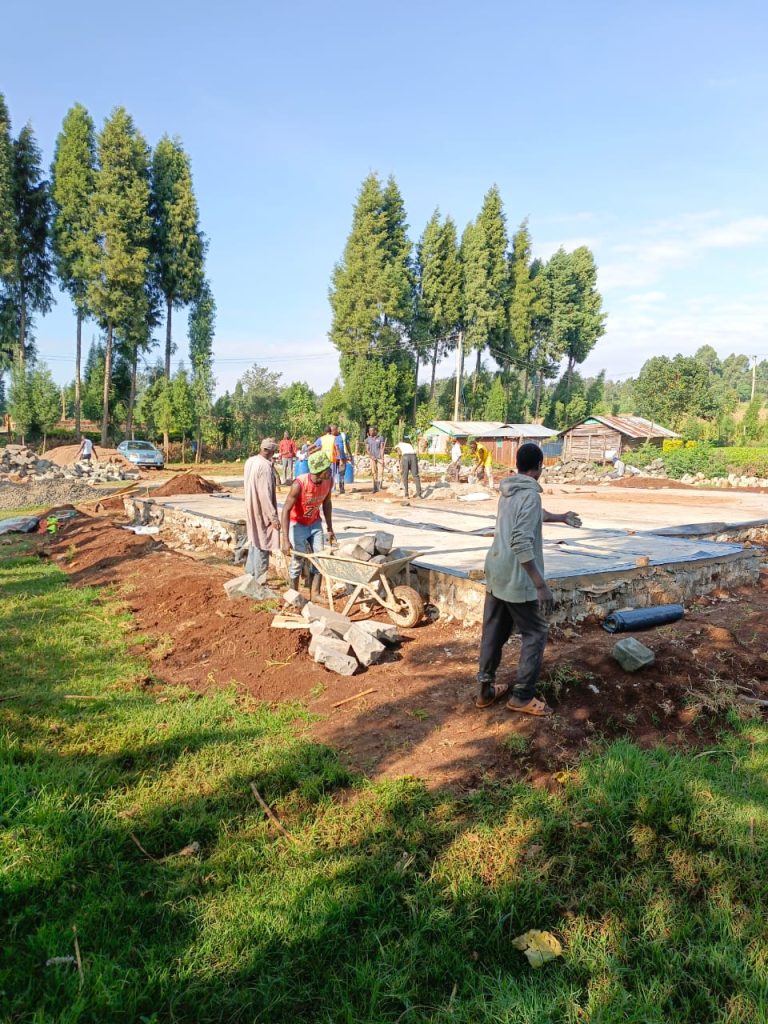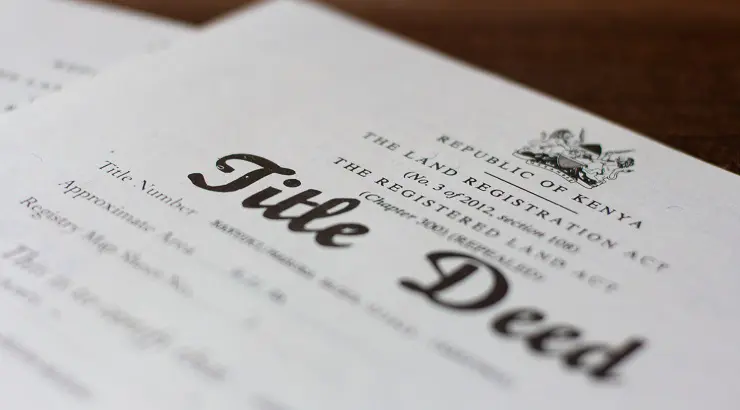Key Documents Required When Buying Land in Kenya
“Ensure a secure land purchase in Kenya by knowing the key documents required when buying land in Kenya. From title deeds and sale agreements to clearance certificates and transfer forms — get the full checklist and avoid costly mistakes.”
Introduction
Buying land in Kenya is a significant investment, and knowing the key documents required when buying land in Kenya is essential. Proper documentation helps confirm legal ownership, avoid fraud, and ensures the land transfer process is smooth and secure.
Without the right paperwork, buyers risk disputes, delays, or financial losses. Understanding which documents are necessary before making any payment or signing agreements helps you make informed decisions.
This guide will walk you through all the essential documents, supporting paperwork, and steps you need to complete a land purchase confidently.
Before You Buy: Key Pre‑Transaction Checks
Before buying land in Kenya, it is essential to carry out comprehensive pre-transaction checks. These steps ensure that the land is legally owned, free from disputes, and suitable for your intended purpose. Failing to verify these factors can result in legal complications, financial loss, or delays in the transfer process. Conducting these checks early also helps you prepare and gather all the land purchase documents in Kenya, making the transaction smoother and safer.

Types of Land Ownership (Freehold vs Leasehold) & Implications for Documents
In Kenya, land ownership comes mainly in two forms: freehold and leasehold. Freehold gives indefinite rights to the land, allowing the owner to use, sell, or transfer it freely. Leasehold grants rights for a fixed period, usually 33, 50, or 99 years, after which the land reverts to the government or original owner.
The type of ownership directly affects the title deed requirements in Kenya and other legal documents you will need. For instance, verifying a freehold title involves confirming the original title deed and checking for any encumbrances or caveats, while leasehold land may require additional approval from the Land Control Board before transfer. Always confirm the ownership type at the lands registry and include this verification in your pre-purchase checklist.
Zoning, Land Use & Verifying Intended Purpose
Before buying, it is critical to check the zoning and approved land use to ensure your intended project is permitted. County planning documents, master plans, and land use permits indicate whether the land is designated for residential, commercial, agricultural, or restricted purposes. Ignoring this step may lead to fines, legal disputes, or denial of development approval.
Buyers should request copies of these documents as part of their paperwork for buying land in Kenya. Key documents to verify include:
- Land use certificate from the county government
- Master plan showing zoning designation
- Any special permits or restrictions attached to the property
Verifying zoning and land use ensures your investment is legally compliant and aligns with your development goals.
Engaging Professionals (Lawyer, Surveyor) – Why You Need Them Early
Engaging a qualified property lawyer and a registered surveyor early in the land-buying process protects your investment and minimises risks. A lawyer can:
- Review contracts and sale agreements
- Verify the authenticity of the title deed and other key documents
- Ensure all consents, including Land Control Board and spousal approvals, are in place
Meanwhile, a surveyor can confirm the land boundaries, verify survey plans, and check for encroachments or disputes with neighbouring plots. Early involvement of these professionals reduces the risk of document errors, fraud, or boundary conflicts, ensuring the transaction proceeds smoothly and legally.
Core Documents Every Buyer Must Secure
Buying land in Kenya requires more than just agreeing on a price. Securing the core documents required when buying land in Kenya ensures legal protection, confirms ownership, and prevents disputes. These documents are crucial for verifying that the land is free from encumbrances, properly registered, and suitable for your intended purpose.
Original Title Deed / Lease Certificate — What It Shows, How to Verify
The original title deed or lease certificate is the most important proof of ownership in any land transaction. It shows the registered owner, the type of land ownership (freehold or leasehold), boundaries, and any restrictions or encumbrances. Before proceeding:
- Confirm the deed is the original and not a photocopy.
- Check the registration number, location details, and size of the land.
- Verify any existing caveats, mortgages, or disputes that may affect transfer.
A genuine deed protects buyers from fraudulent sales, and verifying it at the lands registry ensures you are dealing with the rightful owner. Always cross-check with the seller’s identification to avoid scams.
Official Land Search (Certificate of Search) & Caveats Check
A land search is a formal process that verifies the current owner of the property and identifies any encumbrances. It is a legal requirement before any sale and protects the buyer from hidden liabilities. When conducting a land search:
- Check for outstanding mortgages, government claims, or caveats lodged by third parties.
- Review the land history to confirm previous ownership and legal transfers.
- Ensure the document is issued by a registered lands registry officer.
This step is critical because it prevents you from purchasing land that may be involved in disputes or has financial obligations attached.

Sale Agreement (Contract of Sale) — Essential Contents, What to Watch For
The sale agreement is the legally binding document between the buyer and seller. It sets out the terms of payment, responsibilities of both parties, and conditions for transfer. Key points to review include:
- The agreed purchase price, deposit amount, and payment schedule.
- Deadlines for completing the sale and submission of required documents.
- Clauses addressing defaults, cancellations, or disputes.
A properly drafted sale agreement protects both parties and provides legal recourse in case of breach. Always have a lawyer review it before signing.
Identification Documents & KRA PINs (Buyer & Seller) — Why Even These Matter
Identification documents and KRA PINs confirm the legal identity of the buyer and seller. These are required for all official transactions and ensure that taxes are correctly accounted for. Buyers should:
- Provide national ID or passport and a valid KRA PIN.
- Confirm the seller’s ID matches the registered owner on the title deed.
- Keep copies of all identification documents for future reference.
Without these documents, the transfer of ownership cannot legally proceed, and any transaction may be invalid.
Land Rates & Land Rent Clearance Certificates — Local Authority and Government Dues
Land rates and land rent clearance certificates show that all property taxes and government dues have been paid. Purchasing land without these certificates exposes you to potential penalties or obligations. When reviewing these documents:
- Ensure all county rates have been cleared.
- Check land rent receipts if the property is leasehold.
- Confirm there are no outstanding government levies on the land.
Obtaining these documents ensures you inherit a property free from unpaid obligations, giving you peace of mind and legal protection.
Letter of Consent from the Land Control Board (LCB) & Spousal Consent — When Required
Certain land transactions, particularly involving leasehold or agricultural land, require approval from the Land Control Board. Spousal consent is also mandatory if the land is jointly owned. Key considerations include:
- Confirming that the LCB has approved the sale.
- Ensuring any spousal consent forms are correctly signed and notarised.
- Checking that approvals are current and match the property in question.
These approvals prevent disputes and ensure that the transaction is legally recognised.
Transfer of Land Forms & Stamp Duty Receipt — Finalising the Transfer Process
Transfer forms are submitted to the lands registry to legally change ownership of the property. Payment of stamp duty is a legal requirement, and the receipt proves compliance with tax laws. When completing this process:
- Ensure all forms are accurately filled and signed.
- Verify the amount of stamp duty based on the urban or rural location of the land.
- Keep both digital and physical copies for your records.
Completing these steps finalises the land purchase and provides legal proof of ownership.
Supporting & Optional Documents That Prevent Disputes
Beyond the core documents, supporting documents help prevent future disputes and provide additional evidence of ownership. These documents are particularly useful in verifying boundaries, payments, and previous ownership.
Survey Plan / Map Report & Beacon Verification — How Boundary Documentation Protects You
A survey plan details the exact boundaries and measurements of the land. Beacon verification ensures that the physical plot matches the survey plan, preventing boundary disputes. Important steps include:
- Reviewing the registered survey plan at the lands registry.
- Checking the beacons on-site with a registered surveyor.
- Verifying that the land matches previous subdivision or survey records.
This documentation protects you from encroachment and ensures the land you purchase is exactly as described.
Deposit Receipt & Payment Records — Proof of Payments, Tracking the Money Trail
Always obtain written receipts for any deposits or payments made to the seller. These records serve as proof of transaction and are critical if disputes arise. Tips include:
- Keep a clear payment schedule showing each installment.
- Ensure receipts are signed and dated by the seller.
- Retain both digital and physical copies of all payment records.

Proper documentation of payments helps establish transparency and protects your investment.
Mutation Forms / Subdivision Approvals (If Applicable) — When Land Has Been Subdivided
If the land has been subdivided or changed ownership in the past, mutation forms and subdivision approvals confirm that the land is correctly registered and recognised by the government. Check:
- Previous owners and transfer history on the mutation forms.
- Approvals for subdivisions or parcel divisions.
- Any discrepancies between the survey plan and current land boundaries.
These documents prevent disputes and ensure the land you purchase is fully compliant with legal registration.
For Non‑Citizens/Companies — Extra Document Requirements, Ownership Limitations
Non-citizens and companies face additional requirements when purchasing land in Kenya. These include:
- Special approvals from the Ministry of Lands.
- Limitations on freehold ownership; non-citizens often can only lease for 99 years.
- Additional documents for company registration, compliance, and director identification.
Understanding these requirements ensures non-citizens and corporate buyers comply with Kenyan laws and avoid rejected transactions.
Legal & Tax‑Related Documents to Consider
When buying land in Kenya, understanding the legal and tax-related documents required when buying land in Kenya is crucial. These documents protect both buyer and seller and ensure the transaction complies with government regulations. Without them, you risk inheriting unpaid taxes or legal disputes that can delay or invalidate the transfer.
Capital Gains Tax (CGT) Clearance (Seller’s Side) & How It Affects You
Capital Gains Tax is levied on the profit the seller makes from selling land. Before completing a purchase, request proof that the seller has cleared all CGT obligations. This protects you from inheriting unpaid taxes and ensures the transfer can proceed legally.
Key points:
- CGT is calculated based on the difference between the purchase price and the seller’s original acquisition cost.
- Ask the seller for an official clearance certificate from the Kenya Revenue Authority (KRA).
- Ensure all payments are properly documented to avoid future claims.
By verifying CGT clearance, you reduce your legal and financial risk during the land transaction.
Stamp Duty Documentation and Payment Proof — Urban vs Rural Rates
Stamp duty is a government tax payable on the transfer of land. Rates differ depending on whether the land is urban or rural, with urban land generally attracting higher rates. Key steps for buyers:
- Confirm the exact amount of stamp duty required for your property.
- Obtain and safely store receipts proving payment.
- Ensure the payment is reflected in the official transfer forms submitted to the lands registry.
Proper stamp duty documentation ensures the government legally recognises the land transfer and protects you from future disputes.
Evidence of Cleared Utility Bills, County Rates, and Encumbrances
Before finalising a purchase, confirm that all utility bills and county rates are cleared. Any unpaid bills or encumbrances can become the buyer’s responsibility. Steps to verify include:
- Request receipts for electricity, water, and other utilities.
- Confirm that county rates are up to date.
- Check that the land is free from any legal encumbrances or pending disputes.
This ensures the property is free from hidden financial obligations, giving you peace of mind and legal protection.

Common Document‑Related Pitfalls & How to Avoid Them
Even with the right documentation, mistakes or oversights can occur. Knowing common pitfalls when dealing with land documents in Kenya helps you avoid legal problems and financial loss.
Fake or Duplicate Title Deeds — Red Flags, How to Spot
Fraudulent title deeds are a major risk in land transactions. To spot fake or duplicate deeds:
- Verify the original at the lands registry rather than relying on photocopies.
- Check for discrepancies in plot size, registration numbers, or owner names.
- Be cautious of sellers pushing for quick transactions without proper documentation.
Confirming the authenticity of the title deed is critical to avoid purchasing land you don’t legally own.
Missing Consents (LCB, Spouse) or Transferee Problems — Impact & Risk
Missing Land Control Board (LCB) approvals or spousal consents can invalidate a land transfer. Common risks include:
- Sale being legally contested by the spouse or the board.
- Delays in registration or inability to obtain title transfer.
- Future disputes over ownership rights.
Always ensure all consents are documented and verified before proceeding with payment.
Boundary Disputes Due to Missing Survey Plans or Incorrect Boundaries
Boundary disputes often arise when survey plans are outdated, missing, or inaccurate. To avoid disputes:
- Engage a registered surveyor to verify the land boundaries.
- Compare physical markers with official survey plans.
- Check for encroachments from neighboring properties.
Proper boundary verification prevents future conflicts and protects your investment.
Tips for Verifying Documents — Using the Ardhi Sasa Platform, Visiting Registry, Engaging Lawyer
To ensure all documents are valid and up to date:
- Use platforms like Ardhi Sasa to verify title deed and ownership details.
- Visit the lands registry in person for cross-checking official records.
- Engage a qualified property lawyer to review all documentation and advise on potential risks.
Following these verification steps minimises errors, prevents fraud, and ensures a smooth land transfer process.
Step‑by‑Step Checklist for Document Verification
Before paying a deposit or signing any agreement, it is essential to verify all the key documents required when buying land in Kenya. A structured checklist ensures that nothing is overlooked and protects you from legal or financial risks.
Must-Have Documents Before Paying Deposit
Before making any payment, confirm you have the following documents:
- Original title deed or lease certificate — verified at the lands registry.
- Official land search (certificate of search) confirming ownership and caveats.
- Sale agreement or contract of sale, reviewed by a qualified lawyer.
- Identification documents and KRA PINs for both buyer and seller.
- Land rates and land rent clearance certificates from the county or government.
- Letter of consent from the Land Control Board and spousal consent (if applicable).
- Survey plan and beacon verification (especially if boundary disputes are a risk).
Timelines: What to Gather Before Signing and Transfer
To avoid delays, follow a clear timeline for document verification:
Before Signing Deposit Agreement:
- Verify the original title deed and land search.
- Confirm zoning, land use, and ownership type.
- Check all consents (LCB, spousal, corporate approvals).
Before Final Transfer of Ownership:
- Clear all outstanding taxes, land rates, and utility bills.
- Ensure stamp duty payment is ready and receipts are available.
- Have all transfer forms completed and signed by both parties.
Following this timeline ensures a smooth transfer and protects your investment from disputes or legal challenges.

Costs & Timeline Related to Document Processing
Understanding the costs and timelines associated with land document processing in Kenya helps buyers plan effectively and avoid surprises. Legal fees, surveyor charges, stamp duty, and other administrative costs vary depending on the location, type of land, and complexity of the transaction.
Typical Costs
- Legal Fees: Lawyers typically charge 1–3% of the property value for document review, sale agreement preparation, and transfer assistance.
- Surveyor Costs: Registered surveyors charge based on the size of the land and complexity of the survey, usually from KES 20,000–150,000.
Stamp Duty Rates:
- Urban land: 4% of the property value.
- Rural land: 2% of the property value.
Timeline for Document Checks and Registration
- Land Search & Title Verification: Usually 1–2 weeks, depending on registry workload.
- Sale Agreement Review & Lawyer Consultation: 3–7 days.
- Survey & Beacon Verification: 1–3 weeks, depending on accessibility and surveyor availability.
- Stamp Duty Payment & Transfer Registration: 2–4 weeks after submission.
Planning for these timelines ensures that all land purchase documents in Kenya are processed efficiently without delays in ownership transfer.
Post‑Purchase Document Handling & Ownership Protection
Once the land transfer is complete and the title deed is in your name, proper post-purchase handling is essential to safeguard your investment. This prevents disputes, ensures compliance, and protects your legal ownership.
Key Post-Purchase Steps
- Safe-Keeping of Originals: Store the original title deed and other critical documents in a secure location like a bank safe or fireproof cabinet.
- Notify County and Utility Records: Update the county government and utility providers with your ownership details to avoid service interruptions or incorrect billing.
- Boundary Recheck: Conduct a follow-up survey to ensure physical boundaries align with the registered survey plan, preventing encroachments from neighbors.
- Document Copies: Maintain certified copies of all documents for legal reference, loan applications, or future resale.
Proper post-purchase handling ensures your ownership is legally recognised and minimises the risk of disputes or financial loss in the future.
Conclusion
Securing the key documents required when buying land in Kenya is essential for every property transaction. Proper verification protects you from fraud, ensures legal ownership, and guarantees a smooth transfer process. Failing to check documents or skip professional advice can result in disputes, financial loss, or delays in registration.
To safeguard your investment:
- Verify all ownership and supporting documents before making any payments.
- Engage qualified professionals such as property lawyers and registered surveyors.
- Keep originals and certified copies in secure locations.
- Confirm compliance with local regulations, taxes, and county requirements.
By following these steps, you can confidently complete your land purchase while minimising risk and ensuring legal protection.



